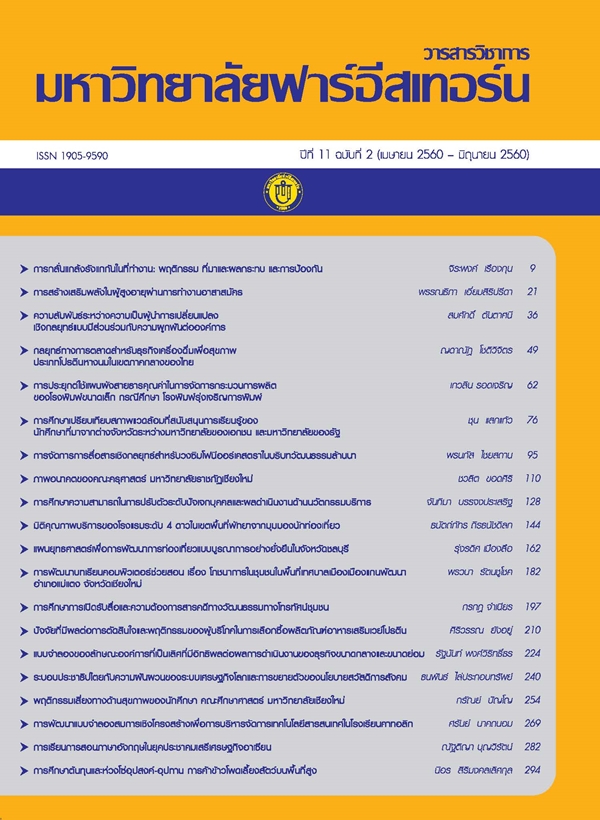การสร้างเสริมพลังในผู้สูงอายุผ่านการทำงานอาสาสมัคร
Main Article Content
Abstract
บทความนี้นำเสนอความสำคัญของการสร้างเสริมพลังให้กับผู้สูงอายุผ่านการทำงานอาสาสมัคร
เพื่อรองรับสถานการณ์สังคมผู้สูงอายุของประเทศไทยที่จำนวนผู้สูงอายุมีแนวโน้มเพิ่มขึ้นอย่างต่อเนื่อง
ในขณะที่จำนวนประชากรวัยแรงงานมีแนวโนม้ ลดลง กำลังแรงงานจากผูสู้งอายุจึงเปน็ พลังสำคัญในการเติมเต็ม
ความต้องการความช่วยเหลือจากชุมชนและสังคม โดยใช้การทบทวนวรรณกรรมเกี่ยวกับการทำงาน
อาสาสมัครของผู้สูงอายุและประสบการณ์การส่งเสริมการทำงานอาสาสมัครของผู้สูงอายุในต่างประเทศ
จากผลการศึกษาพบว่า การสร้างเสริมพลังในผู้สูงอายุผ่านการทำงานอาสาสมัครในประเทศที่พัฒนาแล้ว
เริ่มต้นจากการกำหนดนโยบายการส่งเสริมผลิตภาพในผู้สูงอายุผ่านการทำงานอาสาสมัคร โดยมีหน่วยงาน
ของรัฐเป็นศูนย์กลางในการสนับสนุนและบูรณาการความร่วมมือกับหน่วยงานที่เกี่ยวข้องด้วยการนำเสนอ
งานอาสาสมัครหลากหลายรูปแบบให้อาสาสมัครเข้าร่วมตามความถนัดและความสนใจ และให้ความสำคัญ
กับการศึกษาวิจัยเพื่อค้นหาองค์ความรู้ใหม่ๆ ในการบริหารงานอาสาสมัครให้ประสบความสำเร็จ เพราะ
การทำงานอาสาสมัครนอกจากเป็นประโยชน์ต่อชุมชนและสังคมแล้วยังเป็นเครื่องมือสำคัญในการสร้างเสริม
พลังให้กับผู้สูงอายุ โดยทำให้ผู้สูงอายุมีสุขภาพกายที่แข็งแรง มีสุขภาพจิตที่ดี มีความพึงพอใจในชีวิตและ
สามารถปรับตัวหลังการเกษียณอายุไดดี้ ภายใตก้ ารบริหารจัดการงานอาสาสมัครสำหรับผูสู้งอายุอยา่ งเหมาะสม
ซึ่งบทสรุปของบทความนี้จะนำไปสู่ข้อเสนอแนะเกี่ยวกับการส่งเสริมการทำงานอาสาสมัครในผู้สูงอายุ
และการบริหารจัดการงานอาสาสมัครสำหรับผู้สูงอายุอย่างมีประสิทธิภาพ
This article proposes the empowerment of senior citizens through to volunteer work for support ageing society situation in Thailand, the number of elderly likely increase continuously while the number of working age population tended to decrease. Work force of senior citizens are important power to fulfill the needs of community and society. Research related to volunteer work and experience of promoting volunteer work in foreign countries were reviewed. Results indicated that empowerment of the senior citizens in the developed countries starting from the policy promoting productive ageing through volunteer work. By state agencies is central to support and integration of cooperation with the relevant agencies by offering a variety of volunteer work to participate according to abilities and interests of senior volunteers. With the emphasis on research to find new knowledge for volunteer management because of the volunteering is not only to help community and state agency but also beneficial to the senior volunteer both good physical and mental health and can adapt well after retirement. Under the management of volunteering for the elderly appropriately. These outcomes leads to suggestions on volunteering in the senior citizens and manage volunteer work for the elderly effectively.
Article Details
1. Any views and comments in the FEU Academic Review Journal are the authors’ views. The editorial staff have not to agree with those views and it is not considered as the editorial’s responsibility.
2. The responsibility of content and draft check of each article belongs to each author. In case, there is any lawsuit about copyright infringement. It is considered as the authors’ sole responsibility.
3. The article copyright belonging to the authors and the Far Eastern University are copyrighted legally. Republication must be received direct permission from the authors and the Far Eastern University in written form.
References
คณะกรรมการผู้สูงอายุแห่งชาติ กระทรวงการพัฒนาสังคมและความมั่นคงของมนุษย์. (2553). แผนผู้สูงอายุแห่งชาติ ฉบับที่ 2 (พ.ศ. 2545-2564) ฉบับปรับปรุง ครั้งที่ 1 พ.ศ. 2552. กรุงเทพฯ: โรงพิมพ์เทพเพ็ญวานิสย์.
ศูนย์เทคโนโลยีสารสนเทศและการสื่อสาร สำนักปลัดกระทรวง กระทรวงการพัฒนาสังคมและความมั่นคงของมนุษย์. (2553). สถานการณ์ผู้สูงอายุไทย พ.ศ. 2552. กรุงเทพฯ: อมรินทร์พริ้นติ้งแอนด์พลับชิ่ง.
Arnstein, P.; Vidal, M.; Well-Federman, C.; Morgan, B. & Caudill M. (2002). From Chronic Pain Patient to Peer: Benefits and Risks of Volunteering. Pain Management
Nurses. 3(3), 94-103.
Brown, S.L.; Nesse, R. M.; Vinokur, A. D. & Smith, D.M. (2003). Providing social support may be more beneficial than receiving it: Results from a prospective study of mortality. Psychological Science. 14(4), 320–327.
Brown, S.; Brown, R. M.; House, J. S. & Smith, D. M. (2008). Coping with spousal loss: Potential buffering effects of self-reported helping behavior. Personality and Social Psychology Bulletin. 34(6), 849–861.
Fried, L.; Carlson, M.; Freedman, M.; Frick, K.; Glass, T.; Hill, J. & Zeger, S. (2004). A social model for health promotion for an aging population: Initial evidence on the Experience Corps model. Journal of Urban Health. 81(1), 64–78.
Gill, Z. (2006). Older people and volunteering. Adelaide: Government of South Australian, Office for Volunteers.
Greenfield, E. & Marks, N. (2004). Formal volunteering as a protective factor for older adults’ psychological well-being. Journal of Gerontology: Social Sciences. 59B(5), 258–264.
Harris, A. H. & Thoresen, C. E. (2005). Forgiveness, unforgiveness, health, and disease. In E.L. Worthington, Jr. (Ed.). Handbook of forgiveness. New York: Routledge.
Hong, S. I. & Morrow-Howell, N. (2010). Health outcomes of Experience Corps®: A high-commitment volunteer program. Social Science & Medicine. 71(2), 414–420.
Lum, T. Y. & Lightfoot, E. (2005). The effects of volunteering on the physical and mental health of older people. Research on Aging. 27(1), 31–55.
Luoh, M.C. & Herzog, A. (2002). Individual consequences of volunteer and paid work in old age: health and mortality. Journal of Health and Social Behavior. 43(4), 490–509.
Morrow-Howell, N.; Hinterlong, J.; Rozario, P. & Tang, F. (2003). Effect of volunteering on the well-being of older adults. Journal of Gerontology: Social Science. 58B(3), 37–45.
Musick, M.; Herzog, A. & House, J. (1999). Volunteering and mortality among older adults: findings from a national sample. The Journals of Gerontology. 54B(3), 73–80.
Musick, M. & Wilson, J. (2003). Volunteering and depression: the role of psychological and social resources in different age groups. Social Science & Medicine. 56(2), 259-269.
Mutchler, J.; Jeffrey A. B. & Francis G. C. (2003). From Paid Worker to Volunteer: Leaving the Paid Workforce and Volunteering in Later Life. Social Forces. 81(4), 1267–1293.
National Volunteer & Philanthropy Center, (2007). Doing Good Well. Singapore: National Volunteer & Philanthropy Center.
Onyx, J. & Warburton, J. (2003). Volunteering and health among older people: a review. Australian Journal on Volunteering. 22(2), 65–69.
Pillemer, K.; Wagenet, L. P.; Goldman, D.; Bushway, L. & Meador, R. H. (2010). Environmental volunteering in later life: Benefits and barriers. Generations. 33(4), 58-62.
Ranzijn, R.; Hartford, J. & Andrews, G. (2002). Ageing and the economy: costs and benefits. Australasian Journal on Ageing. 21(3), 145 151.
Sabin, E.P. (1993). Social Relationships and Mortality Among the Elderly. Journal of Applied Gerontology. 12(1), 44-60.
Shmotkin, D.; Blumstein, T. & Modan, B. (2003). Beyond Keeping Active: Concomitants of Being a Volunteer in Old-old Age. Psychology and Aging. 18(3), 602-607.
Van, W. M. (2000). Differential benefits of volunteering across the life course. Journal of Gerontology Social Sciences. 55B(5), 308–318.
WHO. (2002). Active Ageing: A Policy Frame Work. The second United Nation on World Assembly on ageing. Spain: World Health Organization.
